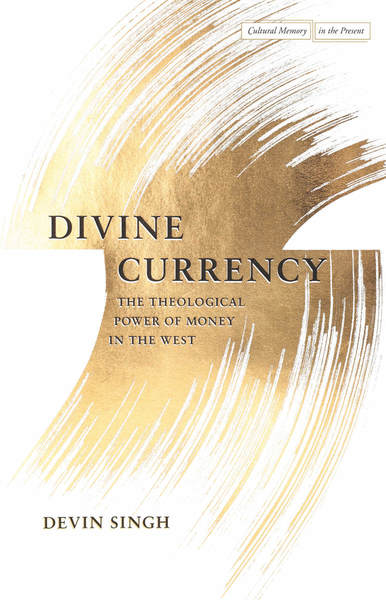
2018
296 pages.
from $28.00
Hardcover ISBN: 9781503604827
Paperback ISBN: 9781503605664
Ebook ISBN: 9781503605671
This book shows how early economic ideas structured Christian thought and society, giving crucial insight into why money holds such power in the West. Examining the religious and theological sources of money's power, it shows how early Christian thinkers borrowed ancient notions of money and economic exchange from the Roman Empire as a basis for their new theological arguments. Monetary metaphors and images, including the minting of coins and debt slavery, provided frameworks for theologians to explain what happens in salvation. God became an economic administrator, for instance, and Christ functioned as a currency to purchase humanity's freedom. Such ideas, in turn, provided models for pastors and Christian emperors as they oversaw both resources and people, which led to new economic conceptions of state administration of populations and conferred a godly aura on the use of money. Divine Currency argues that this longstanding association of money with divine activity has contributed over the centuries to money's ever increasing significance, justifying various forms of politics that manage citizens along the way. Devin Singh's account sheds unexpected light on why we live in a world where nothing seems immune from the price mechanism.
About the author
Devin Singh is Assistant Professor of Religion at Dartmouth College.
"Ground-breaking, erudite, and a pleasure to read, Devin Singh's book prompts us to view the history of Christianity in a new and wholly unexpected way, and in so doing sheds fresh light on the modern world and our contemporary situation. It is also scandalous in the best and most productive of ways."
—Adam Kotsko, North Central College
Divine Currency offers an incisive contribution to the debate about neoliberalism's Christian origins. Devin Singh's bold reading of the sources challenges us to reconsider the relations between theology, politics, and economics."
—Philip Goodchild, University of Nottingham
"Devin Singh probes the true meaning of divine economy, revealing the centrality of economic thinking to the formation of Christian theology. His book is a welcome and timely addition to recent scholarship in religious as well as finance studies, and with far-reaching consequences."
—Susanna Elm, University of California, Berkeley
"Singh's illuminating study shows the power of economic discourse to shape theology, while also demonstrating that one of the reasons theology is able to alter economic practice is precisely that it does not stand outside economic thinking.Clearly written and modestly argued, Singh's work should be taken up by those who would seek to keep economics and theology at arm's length, and by those who would see theology as an artifice which simply hides the "real" power of money."
—Myles Werntz, Reading Religion
"Divine Currency is an intriguing work in religious and cultural studies that challenges much of the work done in theology and economics suggesting that it failed to attend to how the two central mysteries of the Christian faith, the Trinity and incarnation, are implicated both in ancient and modern Western economic dominance....The strength of Singh's work is his historical attention to the use of economic metaphors in the development of Christian doctrine."
—Stephen Long, Marginalia: Los Angeles Review of Books
"[To] read Devin Singh's Divine Currency is to be transported from our commonplace assumptions about the nexus between Christianity and economics into a world, that of late Antiquity, both wonderfully unfamiliar and uncannily resonant with our own....Whilst Divine Currency is a conceptually assured and sophisticated book, it is also grounded in the patient deployment of historical knowledge and philological method."
—Alberto Toscano, Syndicate
"Devin Singh's profoundly important book, Divine Currency, provides readers with invaluable tools to help us understand why it's so hard to talk about God without talking about money, and why it's so hard to talk about money without talking about God."
—Roberto Sirvent, Syndicate
"Singh performs the much-needed task of establishing a vocabulary for the conceptual-historical connections between Christian theology and monetary economy in the West....[The] theoretical blueprint Singh provides us with will no doubt become a guide for future scholarship on Christianity and monetary economy."
—Danube Johnson, Syndicate
"Singh offers a crucial critique of problems contained within Christian thought itself that prop up capitalist systems that undermine human dignity."
—Nichole M. Flores, Modern Theology
"Singh's very simple and yet forceful argument—that a ransom theory cannot but be about money—is compelling. I truly doubt that I will ever be able to think about or to teach [Gregory of Nyssa's] imagery again without taking Singh's explanation into account."
—John E. Thiel, Modern Theology
"Singh's work may enable us to rethink what Christian theology is....Far from accepting a pure theological origin for authorisation and legitimation of doctrine, practice and conduct, Singh charts the messy involvement of Patristic theology with the power practices and techniques of exploitation conducted by the Roman Empire."
—Philip Goodchild, Modern Theology
"Devin Singh presents his readers with a thought-provoking close reading of the deep homology between the concept of oikonomia as it developed in ancient Greek philosophy and early Christian articulations of God's immanence and transcendence....One of the most admirable traits of this book is that it avoids the trap of simplistic or predictable deconstructive critique. Instead, it enacts intellectual humility in light of historical complexity and is satisfied with providing a rich reconstruction of conceptual evolution."
—Alex Holznienkemper, Journal of the American Academy of Religion